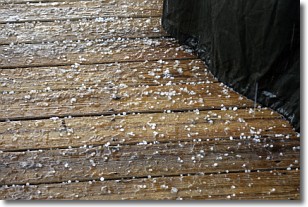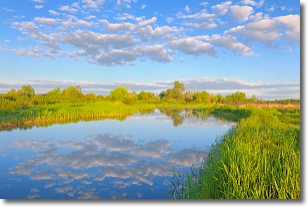Weather Alert in Alaska
Special Weather Statement issued May 23 at 2:04PM AKDT by NWS Fairbanks AK
AREAS AFFECTED: Yukon Flats; White Mountains and High Terrain South of the Yukon River; Fortymile Country; Upper Tanana Valley; Delta Junction; Upper Chena River Valley; Tanana Flats; Eielson AFB and Salcha; Goldstream Valley and Nenana Hills; Chatanika River Valley; Two Rivers; Fairbanks Metro Area; Nenana; Northern Denali Borough; Eastern Alaska Range North of Trims Camp
DESCRIPTION: Increasing moisture and instability over the Eastern Interior will bring heavy rain showers and widely scattered thunderstorms Saturday and Sunday. The atmosphere over the weekend will be more typical of late July than the end of May. Storms that do form will not move quickly and may be nearly stationary, which will allow them to drop abundant rainfall over small areas. Not all areas will see rainfall, but creeks and streams near areas that do see heavy rain may rise rapidly, especially in steep terrain. It is possible that the heaviest rain will fall along the Alaska Highway between Delta Junction and Tok Friday evening and again on Sunday night into Monday morning. Rising freezing levels on Sunday will allow snowmelt from high terrain above Cathedral Rapids and Sheep Creek along the Alaska Highway to add to rainfall in those streams. This may cause very high water in these streams along the Alaska Highway. Recreators should be alert for areas of heavy rainfall, lightning, and for rapidly rising creeks and streams.
INSTRUCTION: N/A
Want more detail? Get the Complete 7 Day and Night Detailed Forecast!
Current U.S. National Radar--Current
The Current National Weather Radar is shown below with a UTC Time (subtract 5 hours from UTC to get Eastern Time).

National Weather Forecast--Current
The Current National Weather Forecast and National Weather Map are shown below.

National Weather Forecast for Tomorrow
Tomorrow National Weather Forecast and Tomorrow National Weather Map are show below.

North America Water Vapor (Moisture)
This map shows recent moisture content over North America. Bright and colored areas show high moisture (ie, clouds); brown indicates very little moisture present; black indicates no moisture.

Weather Topic: What is Sleet?
Home - Education - Precipitation - Sleet
 Next Topic: Snow
Next Topic: Snow
Sleet is a form of precipitation in which small ice pellets are the primary
components. These ice pellets are smaller and more translucent than hailstones,
and harder than graupel. Sleet is caused by specific atmospheric conditions and
therefore typically doesn't last for extended periods of time.
The condition which leads to sleet formation requires a warmer body of air to be
wedged in between two sub-freezing bodies of air. When snow falls through a warmer
layer of air it melts, and as it falls through the next sub-freezing body of air
it freezes again, forming ice pellets known as sleet. In some cases, water
droplets don't have time to freeze before reaching the surface and the result is
freezing rain.
Next Topic: Snow
Weather Topic: What are Stratocumulus Clouds?
Home - Education - Cloud Types - Stratocumulus Clouds
 Next Topic: Stratus Clouds
Next Topic: Stratus Clouds
Stratocumulus clouds are similar to altocumulus clouds in their
fluffy appearance, but have a slightly darker shade due to their additional mass.
A good way to distinguish the two cloud types is to hold your hand out and measure
the size of an individual cloud; if it is the size of your thumb it is generally
an altocumulus cloud, if it is the size of your hand it is generally a
stratocumulus cloud.
It is uncommon for stratocumulus clouds to produce precipitation, but if they do
it is usually a light rain or snow.
Next Topic: Stratus Clouds
Current conditions powered by WeatherAPI.com




